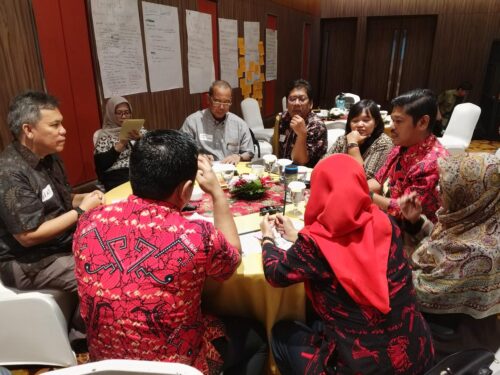Collaboration in Indonesia to Combat Ocean Plastic

For Indonesia, plastic waste entering the ocean is a huge problem. The country is the number two contributor of plastic waste in the ocean causing negative environmental effects and hurting tourism, a driving economic force for the country. (See Jameck et al, Plastic Waste Inputs From Land Into The Ocean) In Indonesia, the USAID Municipal Waste Recycling Program (MWRP) supports seven local organizations through grants that are working to stem the flow of plastic waste to the sea. These organizations aren’t alone in their work. They partner closely with the local governments and the private sector to address this challenge. A dialogue between these partners in December 2019 highlighted ground rules that breed success, shared challenges to address, and new opportunities for collaboration.
Ground Rules for Success
An Articulated Shared Goal: Having a clear and measurable goal to work towards keeps partnerships focused and success tangible.
Clear Roles and Responsibilities: Waste management is typically in the preview of the local government so clarifying boundaries and roles up front maintains positive working relationships and success.
Regular, Transparent Communication: Building trust is a key to long term partnerships and regular communication creates space for learning, adaptation, and new knowledge created with shared data. To keep partnerships moving forward and relevant, setting times, spaces, and places for formal and informal communication is crucial.
Equal Application of Rules: Especially when engaging the private sector, it is important to make clear that any rules, incentives, and disincentives are applied equally and transparently. This makes sure that all actors are on board which ensures broad compliance.
Challenges
Connecting Beyond the Local System: Indonesia is a country made up of more than 17,000 islands spread across an area larger than the United States. Building relationships and collaboration at the local level is only the first step in effective waste management where resources are limited. The type of infrastructure to effectively link recyclables with a global market doesn’t exist for every city in Indonesia. Thus, collaboration beyond municipal jurisdictions is a key for strengthening the local solid waste management systems, including transportation, processing, and market connections.
Behavior Change is Slow: There is widespread agreement that plastic waste in the ocean is a bad thing but realizing meaningful behavior change requires strategic communication, regular education, and reinforcing incentives and disincentives. There is good news however, as a representative of the Alliance to End Plastic Waste put it, “Companies are starting to realize that they have been externalizing their negativities (such as plastic waste) and that is bad for their brand identity which they have spent huge resources to create.” Once this and similar messages are internalized by companies and communities, change has begun.
The Lack of Data: The lack of complete, reliable data about how much plastic waste there is, where it is, and where it is going is at the heart of the challenge. A common refrain is to, “show that a model works, make the business case, and we’ll help to scale it up.” However, the lack of regular and reliable information makes piloting and scaling any model for effective solid waste management a challenge. There are some bright spots, however, in Denpasar, Bali, Indonesia MWRP grantee, Gringgo Foundation, is establishing a ‘crowdsourcing community’ to collect and provide reliable solid waste management geospatial data to communities and the local governments. With support from Google.org, Gringgo is building upon its crowdsourcing tool and developing an image recognition solid waste management mobile phone application to help informal-sector waste collectors increase their collection and recycling rates.
Aligning Profitability and Sustainability: International companies have made big commitments to reducing the use of plastic in packaging and plastic waste in the last five years. However, these big changes don’t happen overnight, and the environment continues to deteriorate under the weight of plastic waste. While ocean plastic is a global problem, solutions need to be local. Local governments and civil society can help incentivize sustainable business models, share data, and assist companies to navigate the nuances of community work. While many businesses have a international level business plan, local governments and civil society can help them start to address the problems right now in communities to start achieving their goals.
New Opportunities for Collaboration in Indonesia
- Create model communities that handle waste collection, processing, and disposal correctly and collect data from these communities so that the model can be scaled.
- Create an open platform for collaboration, opportunities, and plastic production, use, and management regulations for all stakeholders without showing preferences between companies.
- Share local knowledge and seek out financial support from resource partners for solid waste management data collection and logistic costs.
- Work on the safe disposal of and finding a valuable use for low-value plastic waste.
- Build efficient community collection centers and guarantee a certain amount of financing for community waste banks through guaranteed buy-back of recyclables. Increase the capacity of current community collection centers to be more effective.
- Run co-campaigns on community behavior change to improve waste management.

